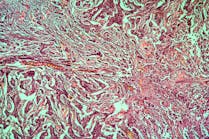Researchers identify brain network that is uniquely activated through injection vs. oral drug use
Results from a new clinical trial suggest that a group of brain regions known as the “salience network” is activated after a drug is taken intravenously, but not when that same drug is taken orally. When drugs enter the brain quickly, such as through injection or smoking, they are more addictive than when they enter the brain more slowly, such as when they are taken orally. However, the brain circuits underlying these differences are not well understood. This study offers new information that helps explain what may be causing this difference.
The study was published in Nature Communications and led by researchers at the National Institute on Drug Abuse (NIDA) and the National Institute on Alcohol Abuse and Alcoholism (NIAAA), parts of the National Institutes of Health, at the NIH Clinical Center.
To better understand how route of drug administration impacts the brain’s response to the drug, researchers conducted a double-blind, randomized, counterbalanced clinical trial using simultaneous PET/fMRI imaging.
Twenty healthy adults participated in the trial. Over three separate sessions, participants received either a small dose of a placebo or of the stimulant drug methylphenidate, commonly known as Ritalin, orally or intravenously. Methylphenidate is a safe and effective prescription medication used for the treatment of attention deficit hyperactivity disorder (ADHD). For research purposes, methylphenidate can be a useful model drug to safely study the relationship between how drugs affect the brain and the subjective experience of drug reward.
After participants received the study drug or placebo, researchers then simultaneously looked at differences in dopamine levels (through PET imaging) and brain activity (through fMRI imaging) while people reported their subjective experience of euphoria in response to the drug.
The PET scan gave an estimate of how fast dopamine increased in the brain in response to the different drug administrations. Consistent with previous research, this study showed that when participants received methylphenidate orally, the rate of dopamine increases peaked more than an hour after administration. Comparatively, when participants received an intravenous injection of methylphenidate, the rate of dopamine increases peaked much faster – within 5 to 10 minutes of the administration.
Through the fMRI, researchers observed that one brain region, the ventromedial prefrontal cortex, was less active after both oral and intravenous administration of the study drug. However, two brain regions, the dorsal anterior cingulate cortex and the insula, which are part of the brain’s salience network, were activated only after receiving the injection of methylphenidate, the more addictive route of drug administration. These same areas of the brain were not activated after taking methylphenidate orally, the route with lower addiction potential. This finding was consistent among all 20 research participants.
In this study, researchers also asked patients to track the real-time, conscious experience of drug reward or euphoria in response to both the oral and intravenous dose of the medication. After receiving the drug intravenously, researchers noticed that the activity and connectivity of the salience network, observed via fMRI imaging, very closely paralleled almost every participant’s subjective experience of feeling high. When the imaging showed increased activity in this part of the brain, participants’ reports of feeling high increased. When the imaging showed decreasing activity in the salience network, participants’ reports of feeling high decreased. Researchers theorize that the network identified in this study is relevant not just for the chemical action of the drug, but also the conscious experience of drug reward.





